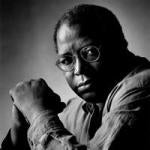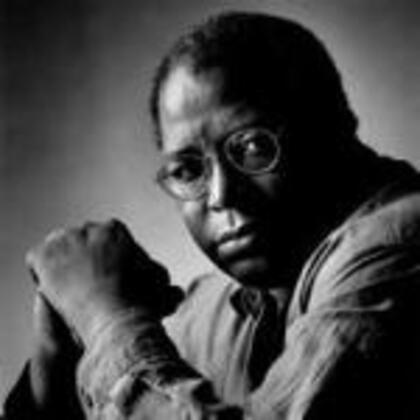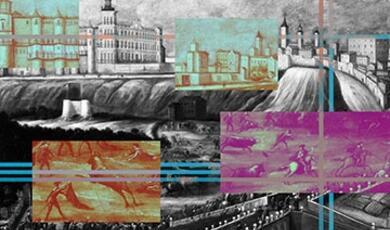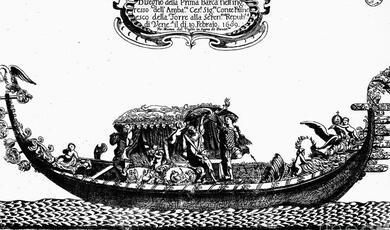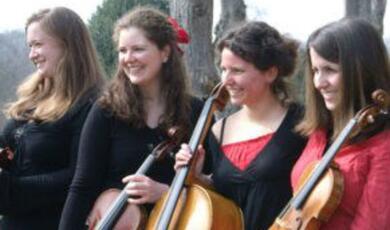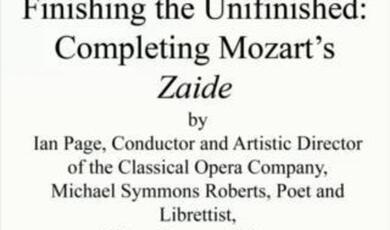Bridgetower – Black Musicians and British Culture, 1807-2007
Share
- Details
- Text
- Audio
- Downloads
- Extra Reading
George Augustus Polgreen Bridgetower, the son of an Abyssinian slave, was hailed as a musical prodigy in the eighteenth century. Taught by Haydn, his appearance at the court in Windsor to play in front of George III led to his subsequent 'adoption' by the Prince Regent. Friends with Beethoven - Bridgetower was the original dedicatee of the Kreutzer Sonata and they gave the first performance together - his life offers a powerful symbolism for the creation and establishment of a black British community which has its roots in the 18th century importation and migration of slaves and ex-slaves.
Professor Mike Phillips is the librettist for the newly-commissioned opera,Bridgetower - A Fable of 1807, to be given its premier as a part of the City of London Festival on the 5th of July. He will be discussing the role of black musicians in British culture in the two hundred years since the Abolition of the Slave Trade act.
Download Text
BRIDGETOWER: BLACK MUSICIANS AND BRITISH CULTURE
Dr Mike Phillips
I must begin by making it clear that I am not an academic researcher or an expert on slavery or an expert on the culture and customs of the Caribbean or Africa, and I have not spent many years in the British Library digging up obscure facts about this topic. So I am not going to get into arcane disputes about the precise number of black musicians who lived in Southwark or how often they did their laundry! But I have read a considerable amount about the topic. I am a novelist and a curator and I have written an exhausting number of words about the history of black people in Britain. This is not a talk about urban rioting or reggae or calypso or gospel music or jazz, although these forms dominate the experience of recent years. I am telling you this partly because I am going to end at the end of the 19th Century, because I only have an hour, and if I got on to the 20th Century, I would be here all night! But in fact, because of the subject of the new opera Bridgetower, a Fable of 1807, and because in general this part of the City of London Festival has focused on the 18th Century and the early 19th Century, I will be dealing roughly with those years.
The other point is that, in general, we tend to talk about black people in Britain, or about the multiracial nature of the population, as if it was an exclusively 20th Century phenomenon. We talk about the respective cultures as if they existed behind barriers, and we talk as if the colour of people's skins defines their cultural prospects and abilities, a tendency which is an exact match for the strictures of 18th Century racial science, with its appalling attempts to categorise human beings in line with a preordained network of characteristics.
Even now, in this country, young black musicians still face a series of nudges in the direction of what everyone will describe as 'their culture', meaning steel bands and rapping. Young black musicians who lean towards classical forms will be more or less guaranteed a difficult time - it would be easier if they wanted to do percussion. Historically, that has meant that, by and large, black musicians in Europe have been written out of the narrative of the very landscape that they helped to shape, and we find ourselves obliged to rediscover figures like the Chevalier de Saint-George or Samuel Coleridge-Taylor - people who were household names in their own time.
In that context, one of the most illuminating and reassuring aspects of looking at the lives of black cultural figures in Britain and Europe is that if you go back between the 16th Century and the 20th Century, you encounter black artists, poets, novelists and musicians who had no problems nor inhibitions in engaging in the cultural environment in which they found themselves. In the process, they tended to affect the culture in which they lived in various specific ways.
I mentioned the 19th Century, but as far back as 1505 we have an African drummer working for James IV in Edinburgh, arranging a dance with dancers in black and white costumes for the Shrove Tuesday festivities. Black musicians are repeatedly mentioned in pageants, fairs and at least one tournament from the 16th Century onwards.
If you come to the 18th Century, they're relatively well-known - black musicians like Cato, who ended up as a head gamekeeper to the Prince of Wales around about 1740, and who was reputed to blow the best French horn and trumpet in his time. In the 18th Century, Londoners were already dancing in what were called black hops, where 12 pence would get you admission.
But as it happened, the use of black bandsmen in the armed forces is the most interesting collection of black musicians in the 18th Century - black drummers and trumpeters in the Dragoons, the Household Guards, the Lifeguards. Black bands proliferated from early on in the 18th Century, round about the 1730s/40s. Regiments came back later on from the Caribbean with black bandsmen as well as being recruited from various points in Europe, and they brought their own style to the enterprise. They are described in this way: 'They capered rather than marched, and flung their drumsticks and tambourines into the air, adroitly catching them in discreetly measured cadence. Their agility with fingers, arms and legs was only equalled by their perfect time in the music.'
It is more important to remember that in European societies where military rituals and observances had an amazing importance, it was, just as the Changing of the Guard now is, almost a shadow of the way that military parades used to work at the time when militarism was even more important than it is now, and the presence of these black musicians and their style did not go unnoticed.
I would like to quote Henry George Farmer, the historian of military music, writing about the influence of the black musicians: 'It should not be forgotten that these negro drummers not only gave a tremendous fillip to regimental music, but it was their contribution in the so-called Turkish music that opened the eyes of the great composers, beginning with Mozart and Beethoven, to the possibilities of a new tone colour and fresh rhythmic devices in the wider realm of orchestral music.'
Well, that is one area, but it brings me to a specific individual, and the first individual I want to talk about would be Joseph Emidy, who lived in Cornwall.
I was in Cornwall last week, in St Ives, giving a talk at Tate, and there were about 50 people, most of them Cornish, in the room, and none of them knew about Emidy. It was a terrific irony because he was quite important in the region in his time. He was born in Guinea in West Africa and we think he was sold into slavery by some Portuguese traders and taken to Brazil when he was a boy, and ultimately went to Lisbon with his master. He was so good at music - he had such an attachment to music - that they gave him a violin and they gave him a teacher, and in three or four years he became sufficiently proficient to play as one of the second violins in the orchestra of the opera at Lisbon.
Now, as we know, Portugal had a long involvement in the slave trade, and a rather more liberal sort of practice than most of the other European nations later on. So it was possible for Emidy to take on this role, but it was quite an achievement in three or four years to become that good at it. But it was both good and bad, because he was seen playing in the opera by Sir Edward Pellow, who was commanding a frigate called The Indefatigable and was pursuing a French fleet when he ran aground and put into Lisbon for repairs. While he was having his ship repaired, he went to the opera, and he saw Emidy. Apparently, after making him an offer to sail with him because he was short of a musician on board. Sailors, apparently, used to entertain themselves by dancing in the evenings - it sounds a bit weird to me, but they did. So Edward Pellow wanted a violinist to play for his crew, and Emidy refused to come, so he kidnapped him. Emidy clearly wanted to escape, so they locked him up and they only let him out to play, and this went on for four years, until Sir Edward Pellow was promoted to another ship and they let him go. Emidy was actually interested in the higher regions of music - Haydn, Mozart and so on - but of course he had to play hornpipe, jigs and reels for four years, which he totally detested and he was very miserable.
However, he got off in Falmouth. Falmouth was a fairly cosmopolitan port, and he set up as a music teacher, I think it was in Truro, and became quite well known, and took quite an outstanding part in local music - he had several reviews of his concerts in the Cornish newspapers. He was for some years leader of the Harmonic Society of Falmouth, playing with various gentlemen, largely military officers, who were skilled amateurs. He wrote music, and he was instrumental in creating a Harmonic Society, which I believe still exists.
Now, what is interesting about Emidy is that he was well known in Cornwall. In fact he was so well known in Cornwall that there was an attempt to get him to London. But he was told that it would be better for him to stay in Cornwall because, in London, his colour would be against him, which is a very odd suggestion given that the next person I am going to talk to you about is Bridgetower, who was, at exactly that time, flourishing as a musician in London.
But Emidy, who had this amazing impact on the local infrastructure of music in Cornwall, has been almost totally forgotten. In fact, interestingly, when I was asked to do the talk at Tate, St Ives, about the role of Cornwall in the seagoing trade in 1807 and in the business of emigration and immigration to Cornwall in the 18th and 19th Century, more than one person said to me, 'Oh but surely there weren't any black people in Cornwall ever and this has got nothing to do with them.' It was an interesting assumption, because it is an assumption that came up again and again and I would like to talk a little bit about that later on.
But I will go on to talk about George Augustus Polgreen Bridgetower. Bridgetower is an interesting person, not simply because he was born in the Esterhazy household; not simply because he was black; not because he was a child protégé, but all those things together, at the time when he arrived in Britain and during his career, had a particular kind of significance.
He was born, as far as we know, in Biala, which was at the time in Poland - I think it is in Austria now. His father worked in the Esterhazy household. The Esterhazys were notable patrons of music, and Joseph Haydn was the Kapellmeister in the Esterhazy mansion. So Bridgetower, as far as we know, first learned his music under the tutelage of Joseph Haydn. Well, Haydn did everything in the Esterhazy house: he supervised the hunting horns, and he wrote, and he conducted 100 pieces a year, which is like almost unbelievable. He wrote oratorios, and of course he was the great innovator, the master, of the symphonic form.
So, it would have been almost impossible for him to have grown up there and not to come under the influence of Haydn, but apparently Viotti was his great hero, and he arrived in Paris playing a concerto by Viotti. Now, Viotti was the violin master, a very peculiar man. He was born in Piedmont and his father was a blacksmith, and he became a musical protégé, but he emerged as a virtuoso at the time when a number of things were changing. He bought one of Stradivarius' violins - I think the Royal College of Music bought it recently. It was characteristic of the changing tone and sound and capacity of the instruments that they had begun to make. Viotti brought, or he is said to have brought, a meeting of styles to his violin playing. Up until not too long ago, to be really respected in the violin, you had to be able to play one of his compositions. So it was probably about the best guru that Bridgetower could have had.
He arrived at the age of 10 I think it was - some people say 11, but it is a little bit difficult to fix the exact time of his birth - but he arrived around that age in Britain. He had been invited to perform for King George at Windsor, and after that, he was invited to play at Bath. His father, who had taken him on this tour, was a genius in public relations. Before and after the performance, he strolled along the promenade at Bath with his son, dressed in Turkish costume, attracting the maximum of attention. Afterwards, he wrote letters of appreciation to the local paper, addressed to the nobility and gentry, visitors of that wonderful city of Bath. Everyone thought he was really cool! There is a piece in the Bath Journalwhich mentions him and says: 'The greatest attention and respect was paid by the nobility and gentry to this elegant father, who is one of the most accomplished men in Europe, conversing with fluency and charming address in several languages.'
Then at about the same time, Bridgetower sold out two more concerts in Bristol on Christmas Eve and New Year's Day, so he made a big splash. There is a little newspaper piece, in the Bath Journal I think it is, which amused me greatly. You read continually about the tears and emotion of the African prince, who is the father. There is this little report that says: 'Miss Cantella's benefit concert at Bath was not equal to her friends' expectations, not withstanding Harrison and young Bridgetower both exhibited. The Black Prince, father of the violinist, by being too officious, has lost the countenance of most of his benefactors, as his concert showed last Saturday morning at the Lower Rooms. Not 50 attended.'
The thing about Bridgetower Senior was that his glamour, whatever it was, began to work against him the longer they were there, and he actually disappears. He disappears from any records that I could find. There is just one reference to him, and I'm not sure that it is him but I think it is probably, of someone being arrested in Bristol, I think it was, for some fraudulent activities.
But the Prince of Wales, who is later the Prince Regent, becomes Bridgetower's patron. As you know, the Prince of Wales was himself not a bad musician and crazy about all forms of the arts. He was in the process of putting together Brighton Pavilion and the band that played there, and they played at Carlton House as well, where he lived.
Bridgetower also become a sort of jobbing musician around London. He would test new musical instruments. It was a time when people were actually not only inventing new musical instruments, it was a time when, for some reason, young musical protégés were very much in demand and apparently coming out of the woodwork all over the place. There are records of Bridgetower pumping the organ in Westminster Abbey with another musical protégé, and so on.
But the high mark of his career - or I suspect he thought it was - was when he went to Vienna, around about 1802 or 1803, and played with Beethoven. Beethoven had been one of Haydn's protégés as well, and he, Bridgetower, came with superior introductions; he came with the Prince of Wales's patronage. He met Beethoven and they appeared to get on well. Beethoven was just finishing what we now know as the Kreutzer Sonata. Bridgetower performed the first performance with him.
The story that he tells about it, or the story that he told a couple of people later on, was that when they played, Beethoven had not yet finished the violin part, and he improvised a particular passage, and this pleased Beethoven so much that he jumped up exclaiming 'Noch einmal, mein lieber Bursch - noch einmal!' which is 'Play it again, Sam!'
Then they had a row. Beethoven crossed out the dedication to Bridgetower, which was something sort of silly, playful: something like a Mulatto Sonata composed for the mulatto Bridgetower, who is a great fool and Mulatto composer. He crossed all that out and dedicated it to Rodolphe Kreutzer, who was a premier player, and who, when he sent it to him, said it was unplayable and sent it back! It serves him right, I guess!
Bridgetower continued to be quite a well known figure in London. He is part of a group. I call them a group because one tends to see groups when you look back in the past. He was a friend of Samuel Wesley, who was an extraordinary musician with a reputation of being mad, bad and dangerous to know; a friend of Thomas Attwood, who was the organist; Viotti and so on.
He was elected to the Royal Society of Musicians in 1807, and then took a degree at Cambridge, a Bachelor of Music, and wrote some compositions, most of which are lost. One or two being played tonight in fact, at the Mansion House in the City of London, but most of what he wrote did not come down to anyone.
I think he was interesting, as I said, because he lived and he worked at a moment when English music was beginning to create a structure that continues to shape the present day. Of course he emerged at a time when, under the Prince Regent's patronage, the entrepreneurship of London was beginning to see itself as a rival to Vienna and Paris.
I have asked myself more than once the question, 'Would English music have been the same without Bridgetower?' and one cannot say. It seems a silly question until you ask the same about Viotti or Samuel Wesley or Thomas Attwood.
That brings me back to the issue of why musicians like Emidy and Bridgetower have been more or less invisible in the cannon until now. One conventional view that is echoed by a number of scholars is that race in Britain and the position of black people, whoever they are, has to be seen in the context of a general unfamiliarity, until the middle of the 20thCentury. This is a view that has conditioned several arguments about the nature of British interaction with the concept of race and with its actual black population over a number of centuries. Curiously, the argument about unfamiliarity tends to underestimate, first, the extent to which what was called the new imperialism, which dominated the latter part of the 19th Century, depended for its coherence on a popular belief in the racial superiority and the racial destiny of the British nation. Secondly, the argument ignores the pervasive presence and influence of black people within the British population.
I want to look next at the effect of the sort of music which took place around and within the Victorian music hall. I want to sketch out something about the concept and the content of minstrelcy, that is black-faced performers. Within the music halls and other sites of public entertainment, these minstrel performances were only one strand in a network of exotic entertainment: you would have Corsican bandits, sheikhs of Arabia, noble Indians, all of them trademarks of some troupe or some individual. Victorian audiences, clearly, did not regard the actors as real representations of these exotic characters, any more than we regard Sean Connery as the real James Bond, but there was something about the way that this image emerged on the Victorian stage which was part of a sort of guide rope to people about how to see the music and the performances that came to them from black performers.
I want to give you an example of a couple of turns that I have taken off some posters. I was looking at one theatre, the Surrey Theatre, which catered for South-East London. It offered a typical selection of exotic performances during the first half of the 19th Century, and these turns included the following titles: Slaves in Barbary; Wild Woman of New Zealand; Columbus; Robinson Crusoe; the Story of the Sultan Morad and his Welcome Guest; Horse Banditi on their Forty Steeds; the Baghdad Fire Worshipers; Barbarosa, or the Tyrant of Algiers; Alhama, the Moor; Juba, who was the African-American dancer William Laing; Lily of the Desert and the Arab Spy; Matilda, or Lugata the Mulatto; Uncle Toms Cabin Dread, a Tale of the Dismal Swamp; Oseola. You can get a flavour of the entertainment from some of the play bills for the halls of the time. One frequently repeated drama in a number of the larger halls was the 'Knights of the Charcoal Burner' or the 'Dripping Well of Nosburgh' - I cannot imagine what that is! - which featured Antonio and the two Young Davids, who gave unrivalled exhibitions on the flying rope and performed on the trumpet with the rope in full swing.
Another bill for the Surrey Theatre advertised Matilda, or Lugata the Mulatto, featuring GW Pell and his talented company of Ethiopian Serenaders, with a collection of Eastern melodies. Well, typically, they were not actually Ethiopians. GW Pell was one of the street minstrels who had migrated towards the middle of the century away from the street to the relative security of the music halls. When Mayhew talked about minstrels in London - they called the minstrels typically niggers - he says, 'Some niggers are Irish. There are Scotch niggers too. I don't know of a Welsh one, but one of the street niggers is a real black, an African.' Now, as this quotation ends, the public is quite clear about the distinctions between the minstrels and the real black people, but the interesting thing, for me, is the extent to which this imagery and the particular sort of music associated with it becomes part of a popular way of making music, in which you have people going on picnics, dressing up and playing minstrel songs. You have got an amazing variety and amazing contradictions coming out of the routine imagery and the culture of the music halls.
For instance, one group, an American group of black former slaves arrived thinking that the music they were offering - gospel music and folk music - would be attractive to an audience which was so hooked on minstrelcy, but nobody came to see them, and they all had to go and get jobs with minstrel troupes in order to make a living. So they would actually, having failed as real performers, they have to go on stage and black up their faces as if they were fake. It struck me that this parody was also a mask that served a similar purpose to the mask of the harlequin and columbine, in much the same way as the form of the pantomime preserved characters like the theatrical dame - a male comedian dressed as a woman - and the principal boy was a woman dressed as a man. In much the same way, you have this pantomime character, but what is interesting is that the music gets communicated through these characters, so you would have gospel music arriving, and you would have various kinds of black music coming out of the States.
The last person I am going to talk about is Samuel Coleridge-Taylor, a composer, born in 1875 in Holborn - just round the corner from Gresham College, off Fetter Lane. This was a place which Dickens described as 'the dingiest collection of shabby buildings ever squeezed together in a rank corner as a club for tomcats.'
His father was a surgeon from Sierra Leone, who studied at King's College. There is some mystery about his mother, but that need not detain us.
Samuel Coleridge-Taylor was brought up in Croydon, became a choirboy, and won a scholarship to the Royal College of Music. Incidentally, I meant to tell you, when we were talking about Bridgetower, that one of the letters we have that was written to Bridgetower came from the original founder of Novello's, who had apparently been a pupil of Bridgetower's. It is an interesting coincidence: when Samuel Coleridge-Taylor graduates, the very first commission that he gets is from Novello's, which has become a prominent music firm by then.
Samuel Coleridge-Taylor graduated from the Royal College of Music, and in his class and playing in one of his first significant concerts, in March 1896, playing in the orchestra, and playing one of his compositions, was Gustav Holtz, who was playing the trombone, and Ralph Vaughan Williams was playing the triangle!
Coleridge-Taylor was, even before he began, a bit of a star. He was commissioned by Novello's before any of his work was even publicly performed, which was, like I said, a nice coincidence because Bridgetower had taught Vincent Novello, who was the founder of the firm.
To cut a long story short, the crowning work of Coleridge-Taylor's career was Hiawatha's Wedding Feast. Hiawatha's Wedding Feast became, certainly in the United States, something that people assumed had a message, a message about race and society and so on. People did not think that in this country; it was simply a very popular piece. I have a friend, Hazel Dacas, whose father played Hiawatha several times and was conducted by Coleridge-Taylor's daughter - he played the viola. He talked about it and he said it was a very popular piece and there were always people rushing around, the choir rushing around and getting dressed up, and it had huge sell-out audiences.
Coleridge-Taylor was also absolutely helped and supported by quite a number of well known musicians, like Arthur Sullivan, who was reputed to have got off his sickbed to go and see Hiawatha. He was working with people within the purview of people like Ralph Vaughan Williams and later on with popular composers like Percy Grainger. He was trying to explore and make popular what he thought of as his particular origins.
It strikes me that one of the things that comes out of my reading of the musicians I have been encountering, particularly around figures like Bridgetower, when I look at people like Emidy and Bridgetower, one of the things that strikes me repeatedly is the sense in which they coped with the environment that they come in to and became not only leading figures but innovators within the musical environment they encountered, without any sense that there was any incongruity in their engagement with a European cultural tradition.
I want to return a little bit to the street musicians of the 18th Century, like Black Billy Walters and Joseph Johnston. Joseph Johnston built a model of a sailing ship and he wore it as a hat, and he would go outside people's windows and he would do clever things with his neck so that it looked as if it was bobbing along the waves. But what Joseph Johnston was doing was to sing nautical ballads. I think of him and I think about what he was doing as having something in common with the confrontation that most of those black musicians had to make with the culture and the environment in which they found themselves, that is to say, they were engaging with the circumstances with which they had to engage because they were who they were, in the time in which they were living. They dealt with it, but they preserved an account, a narrative, about who they were and how they had come to be there, and it is something that you find in what we know about Bridgetower, what we know about Emidy, and certainly what we know about people like Samuel Coleridge-Taylor: this sense in which they prepared themselves to live with what was effectively a dual identity, but with no sense of discomfort about managing and penetrating the culture in which they lived.
I think, if I had the opportunity to talk about the 20th Century, it is one of the things that is characteristic about the way that the music and the work of black artists and black musicians in this country developed in a clear line between the 16th Century and now.
Somebody asked me in St Ives, 'Why do you think that we don't remember Emidy?' I think we do not remember Emidy because the Victorians certainly, and before, created a narrative which was to do with a mono-cultural, exclusive approach to nationality. One of the things that the conduct and the content of these musical biographies and these musical trends demonstrates to me is that that was always wrong; that the Britain we live in always had these different currents within it, and always had several different perspectives engaged in a conversation with each other.
©Dr Mike Phillips, Gresham College, 2 July 2007
This event was on Mon, 02 Jul 2007
Support Gresham
Gresham College has offered an outstanding education to the public free of charge for over 400 years. Today, Gresham College plays an important role in fostering a love of learning and a greater understanding of ourselves and the world around us. Your donation will help to widen our reach and to broaden our audience, allowing more people to benefit from a high-quality education from some of the brightest minds.


 Login
Login
